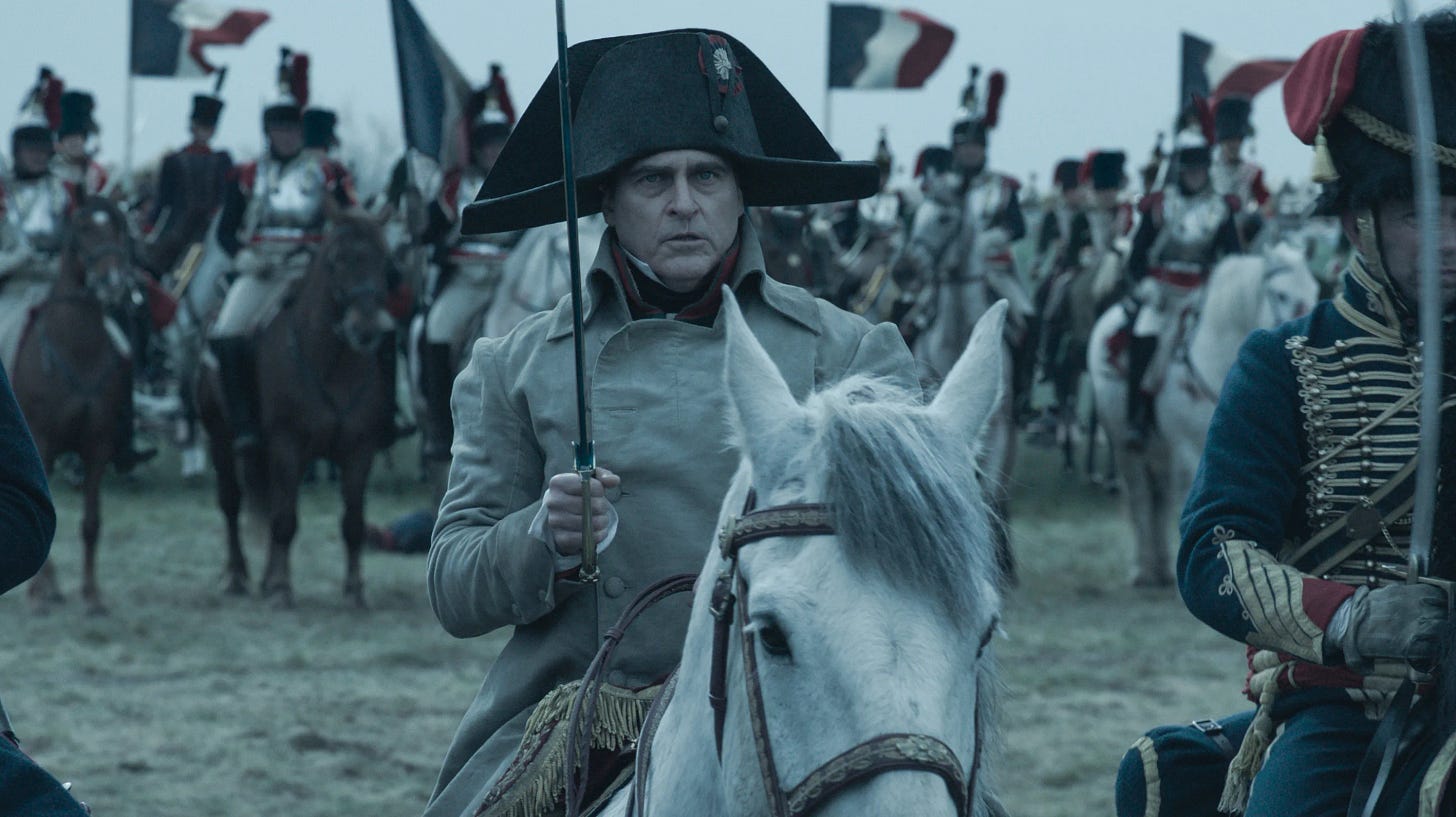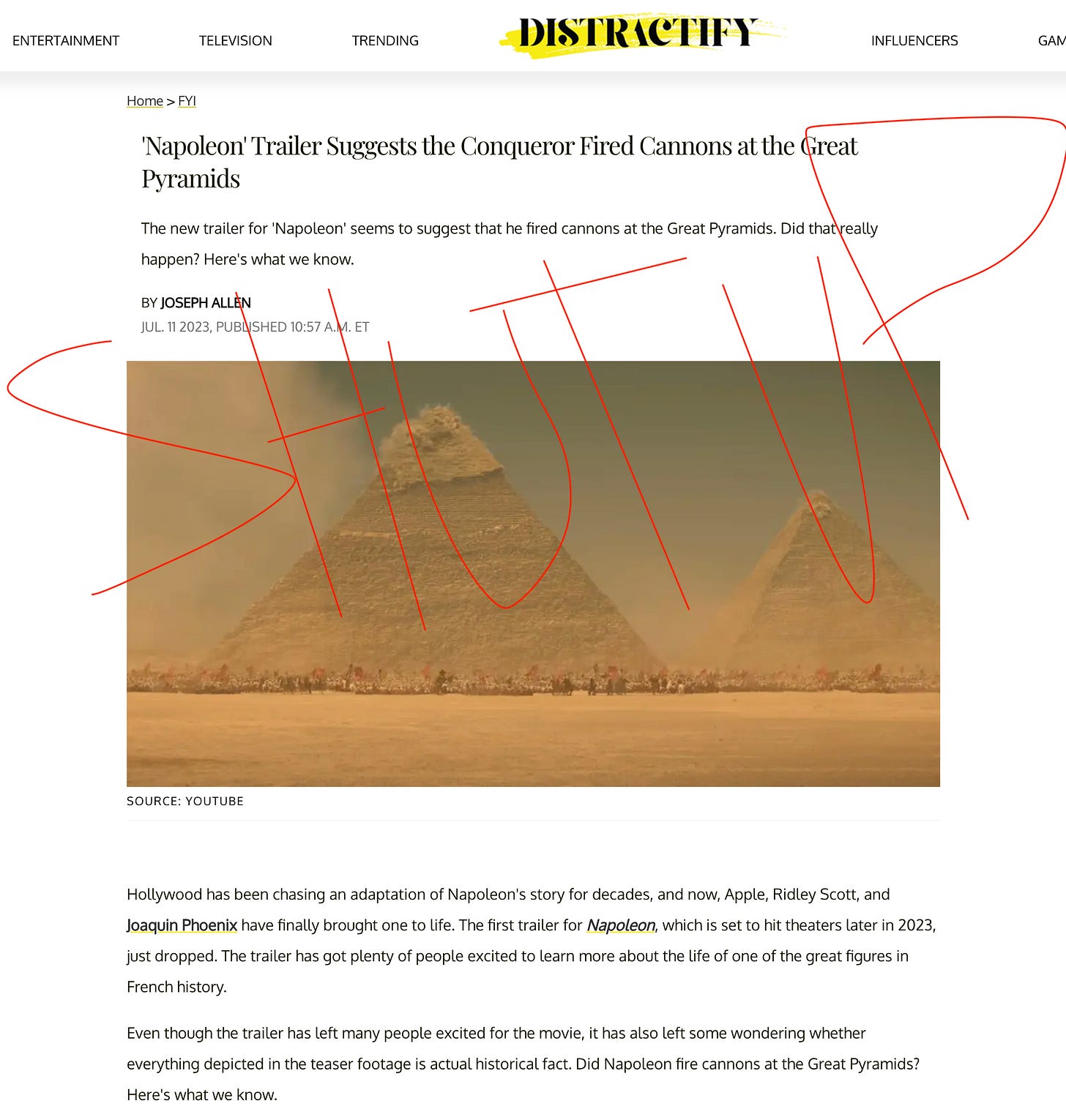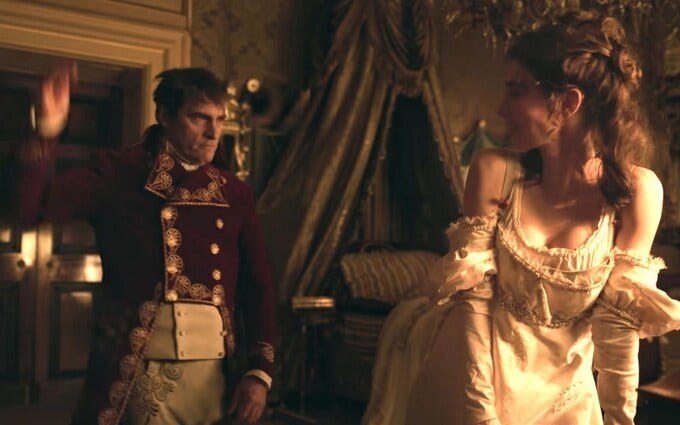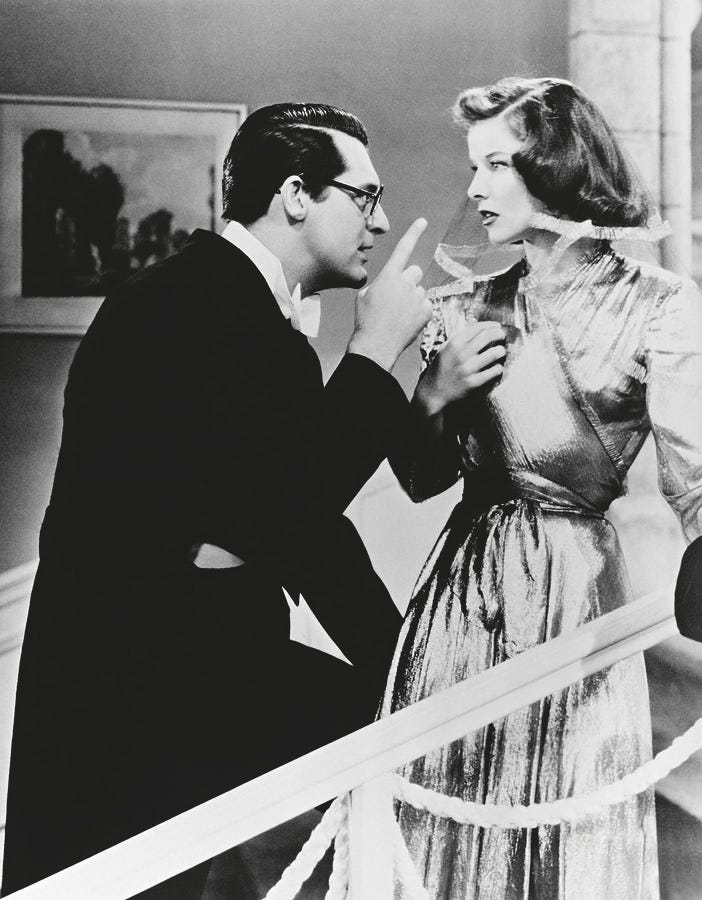Napoleon (Ridley Scott, USA, 2023)
Folks it's good, don't listen to the fools
I can't believe how dumb people are being about this movie. Yes, sure--we aren't going to see this pop up in some essential cinema of the 2020s list in fifty years or anything. But Ridley is our last connection to the genre of the Hollywood historical epic, when every single penny of a budget is put towards recreating the world of the past on screen with hundreds and hundreds of extras and shot on location, an intentional skewing of the historical record that uses Hollywood narrative conventions to further both plot and our understanding of this or that figure, and a use of the star system in order to demystify historical figures from the past (all while re-mythologizing them using the cultural vernacular of the present).
Some of the critiques border on the level of History-Channel-Talking-Head-Fact-Disprover: "Uh, excuse me, Napoleon didn't drown the Austrians in a trap during the Battle of Austerlitz! Wow, now people are going to think that Napoleon shot a cannon at the Great Pyramids!" Jesus Christ people, you're trying to propel the plot forward in an efficient manner--the idea you are supposed to get from these scenes is that Napoleon was a creative military commander who regularly outwitted his opponents, that the French empire brought the imperial West to Egypt in an attempt to not only control trade routes in the region but also to steal a bunch of ancient artifacts from a great Empire from the past. Are you really telling me you wanted an extra forty minutes to explain how all that worked in a movie that is already three hours when you could use the power of a single image to convey the idea itself? Christ almighty. If you're worried people are going to now think that Napoleon drowned the entire Austrian army at the Battle of Austerlitz, you should just be happy that people now know there was something called "The Battle of Austerlitz" because I guarantee that 97% of the country had never heard those words spoken together until the last month.
Bitching aside--what is the case for Napoleon? Gance's 1927 epic stands as a towering achievement for cinematic art, an echo of the mythologized conception of Napoleon as a Great Man of history, a figure of destiny. Nothing else could suffice to tell his story at the time (especially not for a French film made following the First World War). Although some of Scott's other epics seem to discursively position themselves with this level of self-importance--Gladiator a quintessential case of this--it is clear that such mythologizing is far from Scott's mind, and not just because he's British. The movie's tonal oddities would appear as mistakes until you realize the film is a sort of pastiche of now all-but-extinct Hollywood genres: the historical epic, the screwball comedy, or even the British Comedy of manners that Kubrick so synthesized in Barry Lyndon. The film even riffs on Gance, with key scenes fading to white in order to convey the passage of time just like the 1927 film did. But it is truly Hollywood that is the focus of Scott's interest here. Phoenix talking with an American accent while the rest of the cast is British is not an "odd choice" (heard Adam Tooze levy this complaint on the latest episode of his podcast)--its exactly what Hollywood historical epics always did when they cast a star like Charlton Heston as Moses in The Ten Commandments or what have you. Joaquin Phoenix is supposed to demystify Napoleon for us because we are already familiar with Phoenix's star text and the kind of characters he usually plays. Let alone, are you seriously proposing that a Hollywood film cast all unknown French actors or force audiences to read subtitles in a film that was only expected to clear $30m on its opening holiday weekend?
The greatest moments in the film are, I think, the opening thirty or so minutes, which convey the sense of anarchic terror permeating "French Society"--if there even was a society amidst the madness--of the time. Where Gance's Napoleon was destined to lead France out of the morass from childbirth (we see his military genius on display as a child orchestrating a snowball fight at school as if he were orchestrating flanks in a later Napoleonic War battle), here he's just some guy who happens to find himself in a convenient place while seemingly monthly struggles for power began to devolve into who had the most guns. This is illustrated so effectively during the Siege of Toulon scene, where a young Napoleon orchestrates a military incursion that could only emerge from the mind of someone who had all the blood in his body drained and replaced by hubris and envy. The real message of the film is made evident in this scene, as he runs under the cover of night and into the battle scared shitless as if encountering the Real of the unspeakable horror and violence of a world shifting from one system to the next while merely being caught up in the middle.
His marriage to Josephine is similarly presented as at first a marriage of convenience for a rich socialite fully aware that she had narrowly escaped the guillotine and wasn't long for this world unless she could secure some sort of protection from proletarian vengeance in the society that was emerging. I've seen some suggest the film is actually about the power of Josephine over Napoleon, the world's first Wife Guy being outwitted by the true feminist genius of the time despite his reputation for military prowess. But I think the film is doing something else entirely. Both these people just happened to be alive and born into their respective social classes as the old world was dying and the new world was being born: Josephine--trying to ensure her safety (and of course her continued access to privilege as a member of the nobility)--and Napoleon--some weird guy confusing contingency for inevitability.
I was struck by the way few in my theater were laughing at the obvious humor in the middle part of the film, when it settles into the structure of a screwball comedy. I don't think this is because they found it unfunny, rather, it truly felt like they were confused as to why a scene in this Very Important, Realist Historical Drama would take such an odd turn. Napoleon's return from exile on Elba is a great example of all of this put to service for Hollywood generic conventions: while reading the newspaper bored on an isolated island one day, he discovers that Josephine--who mind you he had already divorced--was seen cavorting with the Tsar of Russia. He drops the newspaper in a fit of rage, and one of the next scenes we see is a random beach on the coast of France as a small dinghy reaches the shore and Napoleon, dressed in his full military regalia, walks up the beach to surprised and confused onlookers who thought they were just enjoying a fine afternoon in the sun. The response to this by Professional Historians was outrage that Napoleon did not decide to stage a second coup because of Josephine. But come ON, this is Cary Grant and Katharine Hepburn stuff! For being such History Knowers, few of them seem to know the first thing about the cultural system that made it possible for us to even have a movie about Napoleon in the first place.
So yes, a fun time, a great pastiche of classic Hollywood from one of the last directors who is still operating both within the norms of that system and aware the sun is setting on its form. Every time someone complains that Scott mangles history and then feigns offense when his response is "bug off," they misunderstand that we are witnessing the final years of a Hollywood generic mode that increasingly seems to have no place in our culture of simultaneity, digital spectacle, and symptomatic video game fantasy. If I were a professional historian, I think I'd worry a lot more about that than whether or not Joaquin Phoenix shot a cannon at the Great Pyramid of Giza.
I know I haven’t posted in a year. I don’t know if I’m going to do this more, but I’m thinking about it. Hopefully more to come.







Hey, Matt, welcome back! It's been a while.
You should write more stuff, cause this is really nice. I haven't seen Napoleon yet. Not sure I'll have time, sadly, cause theatrical runs tend to be short these days.
But yeah, it's cool to see Ridley still at it, historical accuracy be damned. (At least to an extent. I tend to have issues with the portrayal of Russian history on screen by Western filmmakers.)
Did you hear that Ridley plans a four-hour cut of the movie, btw? I wonder if that iteration will be more detailed and skip over less events.